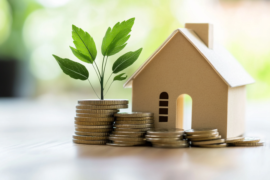This article may contain references to products or services from one or more of our advertisers or partners. We may receive compensation when you click on links to those products or services. Nonetheless, our opinions are our own.
The information presented in this article is accurate to the best of our knowledge at the time of publication. However, information is subject to change, and no guarantees are made about the continued accuracy or completeness of this content after its publication date.

Updated by Albert Fang
Commercial real estate refers to any type of property that is used for a business-related purpose, including offices, industrial buildings, retail spaces, and many more. Historically, investments in commercial real estate have been seen as medium-risk and high-yield, making them exceptionally popular all over the world. Of course, as with any investment, there are drawbacks. So, if you’re considering investing in commercial real estate, take a look at some of the benefits and drawbacks to help you make a measured and informed decision.
Benefits
High-Yield Investment
Commercial properties are known to provide much higher returns on investment than residential properties, for the simple reason that businesses generally have far more money to spend on commercial leases than families do on their residential leases. This, combined with the fact that businesses require a substantially larger square footage from a property, makes commercial property investments much more profitable. Not forgetting the fact that you can increase your rates each year in relation to the rate of inflation.
The best way to maximise your potential yield is to reduce your upfront investment. Commercial property auctions enable you to do this, as they offer investors the opportunity to potentially buy properties at a rate much lower than the current market. Whilst of course there is the risk of the property you are interested in going over the market price, you can simply stop bidding.
People who take their commercial property to market are often doing so in order to make a quick transaction, which is another benefit from the perspective of the investor as you can swiftly begin renovations without months of toing and froing (lease permitting). It is essential, however, to have the property surveyed prior to purchase to prevent any surprises when it comes to the condition of the building.
Good Networking Opportunities
When investing in residential property, it is rare to build a relationship with the tenant. However, in a business setting, it is much more common. Building strong relationships with the tenants in your property will open future business opportunities for you, as well as making it more likely that they will want to continue their lease for longer. A business to business relationship is usually far more professional that in residential property, making your life much easier.
Risk of Loss is Reduced
Everyone is aware of how unpredictable the economic market can be, so spreading your investments is the key to minimising your potential losses. If you invest all your money in one stock or one bank account, and there is a collapse, years of hard work will be lost. So, commercial property offers a great option to protect your assets and benefit from potentially exceptional yields.
No Need For Heavy Involvement
If you’re investing in commercial real estate, you don’t need to be heavily involved as you can work with a commercial property management company. You can take a step back and let the management team take care of any queries or repairs, so this makes a great investment for people wanting a minimal time commitment. However, of course it is always advisable to be clued up on the current position of your investments to make measured decisions.
Longer Lease Opportunities
Residential property leases usually last around a year, followed by a monthly rolling contract, however the opportunity to secure a longer-term lease in commercial property is much greater. With the average commercial lease now lasting eight years, once you have found a tenant, you won’t have to worry about finding another one for a long while. This will offer a substantial and continuous stream of income potential for a decade, so it can support other investments or act as a very nice amount of monthly spending money!
Voted "Best Overall Budgeting App" by Forbes and WSJ
Monarch Money helps you budget, track spending, set goals, and plan your financial future—all in one app.
Get 50% OFF your first year with code MONARCHVIP
Drawbacks
Higher Risk
Whilst the yield from commercial properties is higher, the stability of the industry is lower. Covid-19 is evidence of this, as the retail and office industries have been hit hard. So many businesses have simply been unable to pay their rent, with many liquidating, leaving commercial property owners in a difficult situation. Whilst longer leases offer some level of stability, issues surrounding liquidation will always exist in the commercial property sector. Considerable amounts of insurance must be taken out in order to remedy this issue.
Substantial Investment Needed (Money and Time!)
To invest in commercial real estate, a substantial amount of money is needed. Of course there are options depending on the scale and location of the property, yet for those of you looking for a smaller investment, this is not the right direction to go in.
Additionally, it can take months to buy or sell commercial property if you don’t use property auctions. The complicated nature of commercial property transactions means it is difficult to immediately reap the benefits of your investment. This is something that must be considered prior to purchase.
Another thing to consider is that loans are much more expensive when buying commercial property as opposed to residential. If you are a cash buyer, you will be in an extremely strong position. However, if you are relying on a loan for the purchase, it is sensible to have an in-depth conversation with your financial advisor to decide whether the investment is worth it.
Finally, commercial property leases can be extremely complex and terms may be up for negotiation by the leaseholder. This means that you will need to be prepared for notable amounts of solicitors fees to create a suitable lease that will protect you! Trust me, this won’t come cheap, so it must be considered when deciding if this investment will be right for you.
Ongoing Costs Involved With Management Company
As discussed previously, a benefit of the commercial property industry is that you can easily take a step back and hand control over to a property management company. Yet, this is also a drawback as it requires an ongoing financial commitment. After making a large initial investment, you have to ensure you have the funds available to keep up payments to the management company. If the investment you are making requires a management company, it is essential to factor that cost into your decision prior to committing.
In other words, if you’re investing in commercial real estate, you don’t need to be heavily involved as you can work with a commercial body corporate management company.
Risk of Vacancy
Due to the commitment that is needed as a result of the long leases associated with commercial property, tenants are less likely to simply jump into a decision without serious consideration. As a result, it is common for commercial properties to be vacant for significant amounts of time. You will not be benefiting from rental income during this period, however, you will still be responsible to cover any costs. It is essential that you are in a strong financial position in order to cope with these potential losses.
Summary
Whilst commercial property investments are great for some people, they simply aren’t right for others. Make sure you consider the ongoing financial commitment, the instability of the industry, and the substantial initial investment, whilst also risk assessing issues and having remedies in place to solve them. They can provide a great return on investment, so the commercial property should be considered as a viable investment opportunity.

Reviewed and edited by Albert Fang.
See a typo or want to suggest an edit/revision to the content? Use the contact us form to provide feedback.
At FangWallet, we value editorial integrity and open collaboration in curating quality content for readers to enjoy. Much appreciated for the assist.
Did you like our article and find it insightful? We encourage sharing the article link with family and friends to benefit as well - better yet, sharing on social media. Thank you for the support! 🍉
Article Title: Benefits and Drawbacks of Investing In Commercial Real Estate
https://fangwallet.com/2020/12/03/benefits-and-drawbacks-of-investing-in-commercial-real-estate/The FangWallet Promise
FangWallet is an editorially independent resource - founded on breaking down challenging financial concepts for anyone to understand since 2014. While we adhere to editorial integrity, note that this post may contain references to products from our partners.
The FangWallet promise is always to have your best interest in mind and be transparent and honest about the financial picture.
Become an Insider

Subscribe to get a free daily budget planner printable to help get your money on track!
Make passive money the right way. No spam.
Editorial Disclaimer: The editorial content on this page is not provided by any of the companies mentioned. The opinions expressed here are the author's alone.
The content of this website is for informational purposes only and does not represent investment advice, or an offer or solicitation to buy or sell any security, investment, or product. Investors are encouraged to do their own due diligence, and, if necessary, consult professional advising before making any investment decisions. Investing involves a high degree of risk, and financial losses may occur including the potential loss of principal.
Source Citation References:
+ Inspo












































